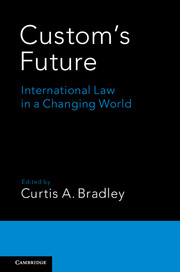Book contents
- Frontmatter
- Dedication
- Contents
- Notes on Contributors
- Introduction: Custom's Future
- 1 Custom's Past
- 2 Customary International Law Adjudication as Common Law Adjudication
- 3 Customary International Law as a Dynamic Process
- 4 Custom, Jus Cogens, and Human Rights
- 5 Customary International Law: How Do Courts Do It?
- 6 Custom's Method and Process: Lessons from Humanitarian Law
- 7 The Growing Obsolescence of Customary International Law
- 8 The Strange Vitality of Custom in the International Protection of Contracts, Property, and Commerce
- 9 The Decline of Customary International Law as a Source of International Criminal Law
- 10 Customary International Law and Public Goods
- 11 Reinvigorating Customary International Law
- 12 The Evolution of Codification: A Principal-Agent Theory of the International Law Commission's Influence
- 13 Custom and Informal International Lawmaking
- 14 Custom's Bright Future: The Continuing Importance of Customary International Law
- Bibliography
- Index
12 - The Evolution of Codification: A Principal-Agent Theory of the International Law Commission's Influence
Published online by Cambridge University Press: 05 February 2016
- Frontmatter
- Dedication
- Contents
- Notes on Contributors
- Introduction: Custom's Future
- 1 Custom's Past
- 2 Customary International Law Adjudication as Common Law Adjudication
- 3 Customary International Law as a Dynamic Process
- 4 Custom, Jus Cogens, and Human Rights
- 5 Customary International Law: How Do Courts Do It?
- 6 Custom's Method and Process: Lessons from Humanitarian Law
- 7 The Growing Obsolescence of Customary International Law
- 8 The Strange Vitality of Custom in the International Protection of Contracts, Property, and Commerce
- 9 The Decline of Customary International Law as a Source of International Criminal Law
- 10 Customary International Law and Public Goods
- 11 Reinvigorating Customary International Law
- 12 The Evolution of Codification: A Principal-Agent Theory of the International Law Commission's Influence
- 13 Custom and Informal International Lawmaking
- 14 Custom's Bright Future: The Continuing Importance of Customary International Law
- Bibliography
- Index
Summary
INTRODUCTION
The International Law Commission (ILC or the Commission) has a mandate from the United Nations (UN) General Assembly (the UNGA or the General Assembly) to codify and progressively develop international law. During most of the ILC's history, the lion's share of its work product took the form of draft articles adopted by the UNGA as the basis for multilateral conventions. The ILC's activities received their principal legal effect during this period through the UN treaty-making process, rather than directly on the basis of the ILC's analysis of what customary international law (CIL or custom) does or should require.
In recent decades, however, the ILC has self-consciously limited its efforts to codify or progressively develop international law in the form of multilateral conventions. Instead, it has turned to other outputs – such as principles, conclusions, and draft articles, that it does not recommend be turned into treaties. Significantly, the Commission often claims that these outputs reflect CIL. For example, despite recommending that the General Assembly not base a treaty on the Draft Articles on State Responsibility, the ILC as well as many states and commentators assert that the draft articles largely reflect CIL.
This change in behavior presents a puzzle. If the ILC is still engaged in codification and progressive development, why has it changed the form of the work it produces? In this chapter, we argue that increasing political gridlock in the General Assembly – by which we mean a division of views over the substance of international norms and lack of enthusiasm for convening multilateral diplomatic conferences – has led the Commission to modify the form of its work to preserve its influence in shaping the evolution of international law. More specifically, we argue that the reduced likelihood of the General Assembly adopting draft articles as treaties closes off the primary mechanism of ILC influence. In addition, if the UNGA or member states reject an ILC recommendation that its draft articles become treaties, that rejection may suggest that the work product does not reflect existing custom – an alternative mechanism of ILC influence. To avoid these negative outcomes, we expect the ILC to turn to other outputs that allow it to continue to influence CIL without the General Assembly's approval.
- Type
- Chapter
- Information
- Custom's FutureInternational Law in a Changing World, pp. 305 - 331Publisher: Cambridge University PressPrint publication year: 2016
- 4
- Cited by



